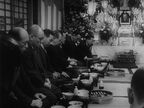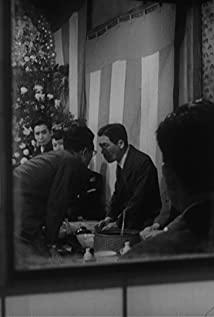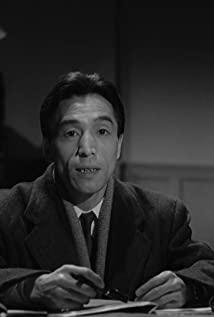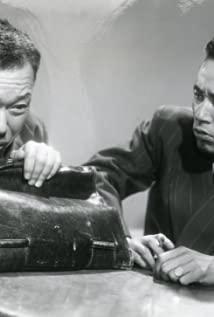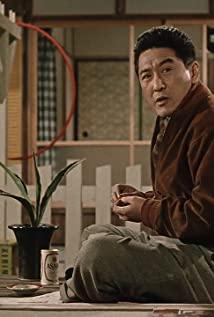Why do people live? What is the meaning of living? In life, many people are alive, but they are already dead. This is just like the 30-year life of the protagonist Watanabe in the film "The Desire of Life". The whole film draws on Watanabe's experience and behavior when he is about to die from stomach cancer. Deep thinking about how to live. But the depth of this film is far from that. After watching this movie, you will deeply feel that it is also a movie. Why are many movies scolded miserably, but some are regarded as classics? There is a reason for being called a film master. For example, Akira Kurosawa's "The Desire of Life", with his understanding of life, makes the whole film touch human nature and move audiences from different countries and times. In this movie, most of the movies can be finished in the first 20 minutes. The narration at the beginning of the film is: Our protagonist is a standard civil servant and the head of the Citizens Section of the City Hall. He has worked like a day for 30 years, and has never asked for a day off, but he can hardly be called conscientious, because in retrospect, three Ten years have passed in the gap between his frequent watches, and he doesn't know what he has done. "This guy who hasn't taken a day off in 30 years, like a dead man, has actually been dead for 20 years. The only purpose of his life is to keep his position, and the best way to keep his position is to do nothing. ” As soon as the show started, there was a classic scene of kicking a ball when several Japanese citizens complained about water seepage in the sewers: starting from the citizen class, shuttled between more than a dozen departments, citizen class, civil engineering class, park class, epidemic prevention class, etc., and finally passed The senator went to the deputy mayor's office. The deputy mayor put on a friendly attitude and said, "I'm very happy that you can come and complain. We have set up a citizen class for this. Then, please go to the citizen class on this issue." So the complaint returned to the origin of the incident. start state. While the audience was hilarious, they couldn't help but admire Akira Kurosawa's shirkiness and bureaucratic irony among the various departments of the city hall, which also happened to reflect the survival philosophy of Watanabe's inaction. What makes people speechless is that it turns out that these are not only unsolved problems in China, but also in various countries. The turning point of the matter is that when Watanabe knew that he was suffering from stomach cancer and he was about to die, a person's desire for life and fear of death made Watanabe unable to be as calm as usual. Every action is restrained and depressed, hesitant and helpless. He unconsciously wanted to confide in his son and daughter-in-law, who had worked hard for most of his life, for comfort. However, when he was waiting for his son, he heard the conversation between his son and his daughter-in-law about planning his retirement. The scene was awkward for a time. , recalling the scenes of raising his son alone, secretly sad, At this time, the voice of his son came from upstairs, and Watanabe climbed upstairs excitedly, but what he heard was: "Close the door." It is said that raising children is to prevent old age, but what the lame Taoist said in the dream of red mansions is in place: there have been many infatuated parents since ancient times, who has seen filial children and grandchildren? This scene is a classic. In Yasujiro Ozu's last film "The Taste of Saury", someone said this sentence: "All man are alone" (All people are alone). The "three straws" in the film also represent that all people are lonely, parents, sons, daughters, spouses, friends, relatives... They are all passers-by and companions in individual life. It is often so unreliable to place one's own happiness, life, and even the meaning of life on others. They cannot comprehend the joys and pains of other individuals, and often cannot share the joys and pains of other individuals; more often, they are caught up in their own joys and pains, so they ignore or hurt others, even their own sons. In the dance hall in the film, musicians are playing or drumming on the high stage. The dance floor is crowded with people and the black heads are surging like an ant colony. Watanabe is also among them, being hugged by a dancer. But Watanabe's eyes were still at a loss, he was so lonely among the ocean-like crowd. Life is like an ant, and everything is like a dog. And most tragically, everything in Watanabe's life was taken away: his son, his job, his health. Sociology has a noun "self-identity" (Self-definition), each of us needs "self-definition" in order to determine the existence of self as distinct from others. If I were a writer, I was a father, and Watanabe found at this point that the "elements" that formed his self-definition were all but gone: the son no longer needed him, and the work turned out to be "doing nothing", and his 30-year-old most notable The "performance" is never absent. When he was about to reach the end of his life, he realized that his life was meaningless. Only then did he realize that he was living such a life without self, without active choice, and without so-called pursuit. , he was afraid. Really want to face the confusion and despair of death, struggling for several days, bought a big box of sleeping pills but finally gave it to others, Watanabe chose to live, chose to face, but how to live in a limited life Well, this is a problem not only for the protagonist, but for everyone. Watanabe's long life as a civil servant has institutionalized him, and institutionalization has left them ignorant of life outside the system. How difficult it is for a person to live in the same pattern for 30 years and ultimately want to be different! When Watanabe sought a breakthrough and wanted to be different, he first chose the easiest thing to do: eating, drinking and having fun. Trying to anesthetize yourself with the self-proclaimed kind-hearted writer of vulgar novels, indulgence has always been the easiest option, to get a short-lived thrill, to hypnotize consciousness with alcohol, to get self-righteous pleasure, however, indulgence is never the meaning of life , the night of sensuality brought only physical exhaustion and a deeper emptiness to Watanabe. So, in the flashy singing and dancing, Watanabe unconsciously sang: "Life is so short, let's fall in love with a girl. Before the red lips fade, before the enthusiasm turns cold, no one knows what will happen. No one knows what will happen tomorrow; life is so short, let’s fall in love with a girl, before the black hair fades, before the flame of love goes out, today will never come again, today will never come again...” , the voice is low and vicissitudes of life, expressing the deceased's desire for life to the fullest, and the viewers are not moved. The sense of meaninglessness brought by indulgence brought him even greater fear, and he hoped that he could truly survive, instead of being like a walking dead like before. Fortunately, he met a colleague who came to him to resign, a girl who didn't want to institutionalize herself in the city hall, and he was moved by this happy and healthy life. He unconsciously wanted to touch this living life to drive away the breath of death. When the girl finally got bored with him, he asked in pain and despair, "Why do you live so unbelievably, and I want to live like you, my mummy. ", the girl took out the rabbit made in the factory and said, "I make However, this hasty and superficial narrative method is not the style of Akira Kurosawa, and the subsequent wonderful classics are all here, and it also embodies Akira Kurosawa's exquisite observation and thinking on life and society. The film suddenly cuts to Watanabe's death. In the mourning hall, colleagues had a vigil in front of the mourning, layer by layer, they were discussing the reasons for Watanabe's great change in temperament. In the conversations of these colleagues, we saw Watanabe's determination and hard work after his rebirth, and also saw the faces of these institutionalized and institutionalized people, who desperately smeared gold on themselves for their own fame and wealth. At the end of the memorial ceremony, they drank swayingly, seemingly moved by Watanabe's behavior, and vowed to be reborn and reborn through the wine. Ironically, however, the next day, after sobering up, the impassioned reincarnation disappeared, and everything was business as usual. When the citizens complained about the problem of a water ditch, the new head of the department answered without hesitation and went to the civil engineering class. At this moment, a man stood up and looked at his new boss angrily, but finally didn't say anything, and slumped up the chair that fell to the ground. This is his helplessness, it is the helplessness of each of us. Watanabe was like this many years ago, and we may be like this now, or we have been, or we will be like this, or have been like this. An excellent film can cause people to think about many problems unconsciously. The topics he leads are the profound exploration of Akira Kurosawa's meaning of life in this film, the prevarication of the bureaucracy, and the deformity in the system. Personality, open and secret battles in the officialdom, all gave wonderful satire and criticism, and also pointed out social realities such as the problem of the elderly and the lack of family. Every point of view can lead to an excellent work. Every point is deeply portrayed, and it is no wonder that Steven Spielberg regards this film as the most classic Kurosawa Akira movie. However, this hasty and superficial narrative method is not the style of Akira Kurosawa, and the subsequent wonderful classics are all here, and it also embodies Akira Kurosawa's exquisite observation and thinking on life and society. The film suddenly cuts to Watanabe's death. In the mourning hall, colleagues had a vigil in front of the mourning, layer by layer, they were discussing the reasons for Watanabe's great change in temperament. In the conversations of these colleagues, we saw Watanabe's determination and hard work after his rebirth, and also saw the faces of these institutionalized and institutionalized people, who desperately smeared gold on themselves for their own fame and wealth. At the end of the memorial ceremony, they drank swayingly, seemingly moved by Watanabe's behavior, and vowed to be reborn and reborn through the wine. Ironically, however, the next day, after sobering up, the impassioned reincarnation disappeared, and everything was business as usual. When the citizens complained about the problem of a water ditch, the new head of the department answered without hesitation and went to the civil engineering class. At this moment, a man stood up and looked at his new boss angrily, but finally didn't say anything, and slumped up the chair that fell to the ground. This is his helplessness, it is the helplessness of each of us. Watanabe was like this many years ago, and we may be like this now, or we have been, or we will be like this, or have been like this. An excellent film can cause people to think about many problems unconsciously. The topics he leads are the profound exploration of Akira Kurosawa's meaning of life in this film, the prevarication of the bureaucracy, and the deformity in the system. Personality, open and secret battles in the officialdom, all gave wonderful satire and criticism, and also pointed out social realities such as the problem of the elderly and the lack of family. Every point of view can lead to an excellent work. Every point is deeply portrayed, and it is no wonder that Steven Spielberg regards this film as the most classic Kurosawa Akira movie. Business as usual. When the citizens complained about the problem of a water ditch, the new head of the department answered without hesitation and went to the civil engineering class. At this moment, a man stood up and looked at his new boss angrily, but finally didn't say anything, and slumped up the chair that fell to the ground. This is his helplessness, it is the helplessness of each of us. Watanabe was like this many years ago, and we may be like this now, or we have been, or we will be like this, or have been like this. An excellent film can cause people to think about many problems unconsciously. The topics he leads are the profound exploration of Akira Kurosawa's meaning of life in this film, the prevarication of the bureaucracy, and the deformity in the system. Personality, open and secret battles in the officialdom, all gave wonderful satire and criticism, and also pointed out social realities such as the problem of the elderly and the lack of family. Every point of view can lead to an excellent work. Every point is deeply portrayed, and it is no wonder that Steven Spielberg regards this film as the most classic Kurosawa Akira movie. Business as usual. When the citizens complained about the problem of a water ditch, the new head of the department answered without hesitation and went to the civil engineering class. At this moment, a man stood up and looked at his new boss angrily, but finally didn't say anything, and slumped up the chair that fell to the ground. This is his helplessness, it is the helplessness of each of us. Watanabe was like this many years ago, and we may be like this now, or we have been, or we will be like this, or have been like this. An excellent film can cause people to think about many problems unconsciously. The topics he leads are the profound exploration of Akira Kurosawa's meaning of life in this film, the prevarication of the bureaucracy, and the deformity in the system. Personality, open and secret battles in the officialdom, all gave wonderful satire and criticism, and also pointed out social realities such as the problem of the elderly and the lack of family. Every point of view can lead to an excellent work. Every point is deeply portrayed, and it is no wonder that Steven Spielberg regards this film as the most classic Kurosawa Akira movie.
View more about Ikiru reviews




